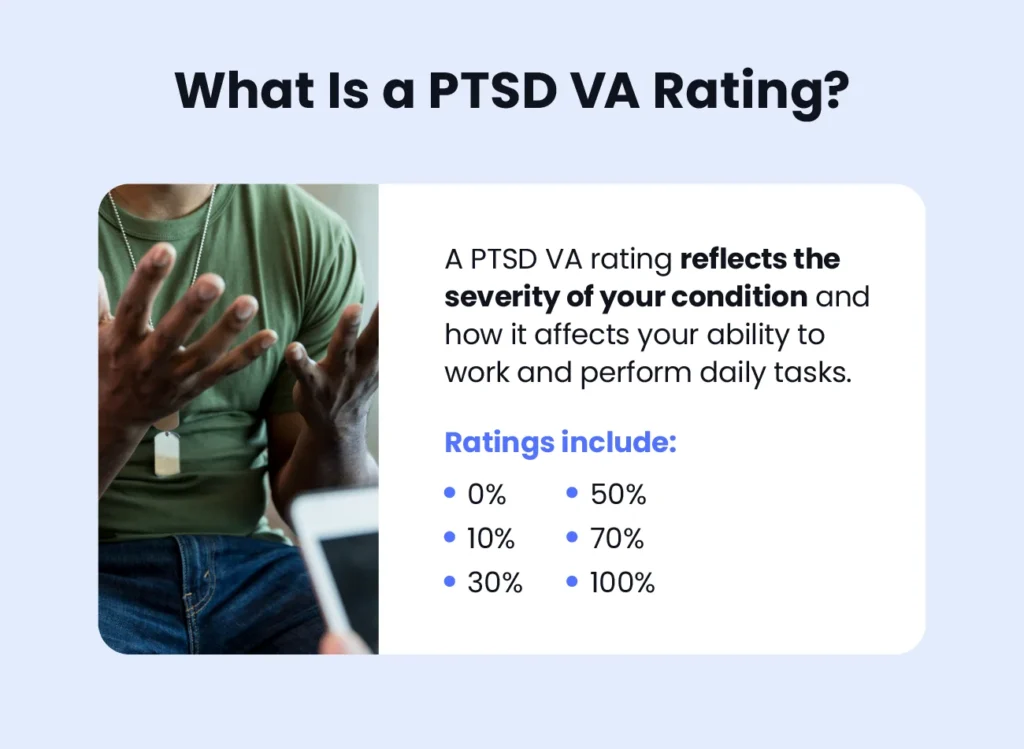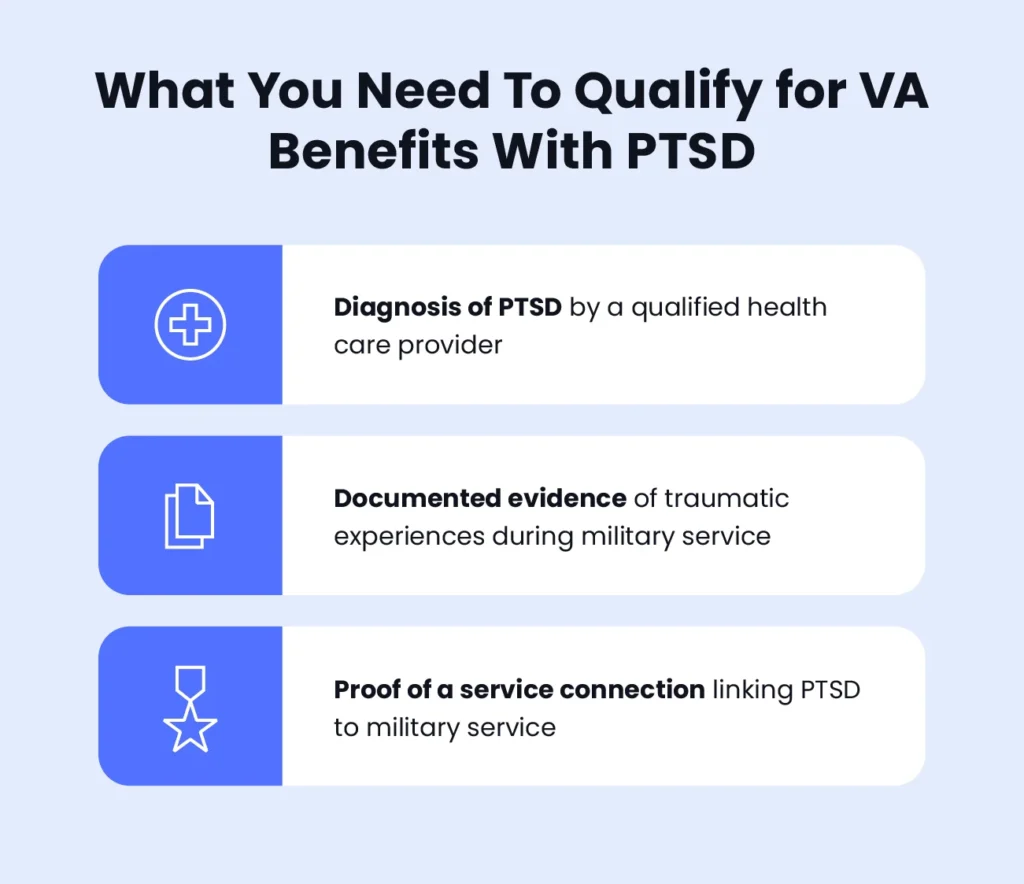Post-traumatic stress disorder (PTSD) is a debilitating mental health condition that can significantly disrupt daily life and result in long-term disability. For those who’ve developed PTSD due to their military service, there is potential eligibility for VA disability compensation.
This compensation offers tax-free monthly payments to support those affected. If you’re dealing with the aftermath of traumatic experiences during your service and wondering about the PTSD VA rating, continue reading to explore the criteria and process involved.

Is PTSD a Disability?
Yes, PTSD can qualify as a disability. It’s a mental health condition triggered by experiencing or witnessing a traumatic event and is particularly prevalent among combat veterans. PTSD can have a major impact on daily life, including relationships, work, and overall well-being.
The level of social and occupational impairment resulting from PTSD varies from person to person. So, having some PTSD symptoms or a related mental disorder doesn’t automatically qualify someone for PTSD compensation or disability benefits.
If PTSD symptoms hinder your ability to work, you may be eligible for VA disability benefits or Social Security Disability Insurance (SSDI).
Common Symptoms of PTSD
PTSD is one of the most common disorders claimed by veterans. Here are some symptoms of PTSD veterans can experience:
- Flashbacks: Vivid, intrusive memories of the traumatic event
- Nightmares: Repeated, distressing dreams related to the trauma
- Intrusive thoughts: Unwanted thoughts related to the traumatic event or safety concerns
- Trouble sleeping: Insomnia, nightmares, or flashbacks leading to exhaustion
- Emotional numbness: Difficulty engaging emotionally with others and feeling disconnected from family life
- Dissociation: Loss of memory and feelings of detachment from reality
- Difficulty controlling temper and anger: Rage, outbursts, or intermittent explosive disorder
- Anxiety and panic attacks: Generalized anxiety disorder (GAD) and panic attacks
- Sadness or depression: Persistent sadness, loss of interest, changes in appetite, and suicidal thoughts
- Agoraphobia: Fear of leaving home or avoiding triggering places or people
- Hypervigilance: Heightened response to stimuli, easily startled, and always being on guard
- Guilt or shame: Feelings of guilt or shame related to actions during the traumatic event
- Difficulty concentrating or completing tasks: Memory problems, difficulty focusing, and lack of interest in work or school tasks
Note: PTSD symptoms can vary in severity and may not appear immediately after the traumatic event. They can develop over time or be triggered by reminders of the trauma. If you or someone you know is experiencing these symptoms, seeking professional help is recommended.
How To Qualify for VA Benefits for PTSD
To qualify for VA benefits for PTSD, individuals must meet specific criteria established by the Department of Veterans Affairs (VA). Here’s what you’ll need to qualify for veterans benefits for PTSD.

Receive PTSD Diagnosis
Veterans seeking benefits for PTSD must receive a diagnosis from a qualified health care provider. This diagnosis is typically obtained through a comprehensive evaluation conducted by a therapist, psychiatrist, or general practitioner.
The formal diagnosis is made using the Diagnostic and Statistical Manual of Mental Disorders, 5th Edition.
Provide Evidence of Severe PTSD Symptoms
Evidence of the severity of your PTSD symptoms is crucial for your benefits claim. This may include:
- Medical records documenting PTSD symptoms
- Statements from fellow service members or family regarding changes in behavior
- Relevant military records detailing traumatic experiences
Physicians and psychiatrists must demonstrate that sufferers of PTSD have had exposure to “actual or threatened death, serious injury, or violence.” They also must document that the claimant has had involuntary — meaning not induced or brought out through hypnosis or other therapeutic techniques — intrusive memories, dreams, or flashbacks.
Health care providers must also document how PTSD diminishes the claimant’s ability to interact with others and handle daily responsibilities, including difficulties concentrating, remembering, or managing one’s behavior in an acceptable and professional manner.
In the absence of documentation of these limitations, therapeutic care records should indicate minimal capacity to adapt to changes or demands for two years or more (see 12.00G2c).
Establish a Service Connection
To be eligible for VA benefits for PTSD, veterans must establish a service connection, demonstrating that their PTSD resulted from traumatic experiences during military service. This can include:
- Suffering a serious injury, personal or sexual trauma, or sexual violation
- Someone or something threatening you with injury, sexual assault, or death
A nexus letter from a medical professional can strengthen your claim by establishing a connection between your PTSD symptoms and your military service. This letter should outline the traumatic events you experienced during service and their impact on your current mental health condition.
It’s possible if you experienced a traumatic event before service, and your military service made it worse, you can qualify for benefits — this requires that a doctor affirms the condition didn’t just worsen due to the natural progress of the disorder but was aggravated by military service.
Filing VA Disability Claims for PTSD
Once you’ve collected all the relevant documents and evidence that support your PTSD diagnosis, follow these steps to file for VA disability:
- Collect all relevant documents supporting your PTSD diagnosis.
- Fill out VA Form 21-526EZ online, by mail, or in person.
- Attend scheduled compensation and pension (C&P) examinations if needed.
- Await the VA’s decision; this process may take months.
- Appeal if necessary; follow VA instructions and seek assistance if needed.
If your claim is denied, you have the right to appeal. Follow the instructions provided by the VA for filing an appeal and seek assistance from a veterans disability attorney if needed.
Many Veterans Service Organizations (VSOs) provide free services to help veterans apply for disability benefits. Groups such as the Veterans of Foreign Wars, Disabled American Veterans, and American Legion maintain offices at the regional benefit centers with accredited officers trained to help you file your claims. They help you navigate the process and can increase the chance that you successfully document your PTSD claim.
VA PTSD Rating Chart
After filing a claim and being diagnosed, you will be measured for the level of impairment, from 0%-100%, depending on how much the condition interferes with normal life functions.
It’s important to note that not all disabilities are assigned the same VA disability rating percentage. For instance, the VA disability rating for mental disorders like PTSD includes only 0%, 10%, 30%, 50%, 70%, or 100% levels of impairment.
For the VA PTSD rating criteria, check out the general rating formula for mental disorders below:
| Rating | 4.130 Schedule of Ratings for Mental Disorders |
| 0% | Symptoms aren’t severe enough to interfere with daily functioning or require continuous medication |
| 10% | Mild symptoms affecting work efficiency during periods of stress, controlled by medication |
| 30% | Occasional decrease in work efficiency due to symptoms like depression or anxiety |
| 50% | Reduced reliability and productivity due to symptoms like impaired memory and judgment |
| 70% | Deficiencies in multiple areas, such as work and relationships, due to symptoms like suicidal ideation and impaired impulse control |
| 100% | Total impairment in daily activities due to symptoms like hallucinations or inability to perform basic tasks |
These ratings are based on symptoms’ severity, duration, frequency, and impact on daily functioning and quality of life. The more frequently PTSD symptoms occur and the longer they last, the higher the potential disability rating.
The VA also considers the occupational and social impairment level caused by PTSD. An evaluation considers how these symptoms affect a veteran’s ability to work, build relationships, maintain social interactions, and enjoy a healthy overall quality of life.
If the symptoms significantly impair a veteran’s ability to maintain employment or relationships, it can lead to a higher disability rating.
VA Disability Compensation for PTSD
The monthly benefits you receive are determined by your PTSD VA rating. Here are the 2024 veterans disability compensation rates:
| PTSD VA Rating | Monthly Compensation for Veterans Without Dependents |
| 0% | N/A |
| 10% | $171.23 per month |
| 30% | $524.31 per month |
| 50% | $1,075.16 per month |
| 70% | $1,716.28 per month |
| 100% | $3,737.85 per month |
Note: These compensation rates can increase if you have dependents such as a spouse, child, or parent.
Learn More About Your VA Disability Eligibility
The PTSD VA rating is meant to capture the severity of your condition and how much it affects your ability to work and perform daily tasks. If you’re experiencing severe symptoms of PTSD, you should not feel any stigma in applying for benefits.
Just like any other illness, if you have been injured to such an extent that you can no longer support yourself, you are entitled to receive assistance from the government.
At Benefits.com, we’re committed to helping you understand the various benefits available for military veterans. To learn more, take our Benefits Quiz and find a plan that works for you.
Frequently Asked Questions
What Is the Average VA Rating for PTSD?
A common (but not universal) VA disability rating for PTSD is ~50%. This rating signifies that the symptoms of PTSD significantly impair a veteran’s ability to function in various areas of life, such as employment, relationships, and self-care. However, it’s important to note that PTSD’s severity can vary widely among individuals. Some veterans may receive higher or lower ratings based on their specific circumstances.
Is It Hard To Get VA Disability for PTSD?
It may be hard to get disability for a mental illness like PTSD, but it’s not impossible. The process involves thorough documentation of your PTSD symptoms, including medical records, statements from health care providers, and evidence of the impact on your daily life. You must also show a clear connection between your PTSD and your military service.
While the application process can be time-consuming, seeking assistance from an attorney or experienced professional can improve your chances of success. It’s important to be persistent and thorough in gathering and presenting evidence to support your claim.
What Other VA Benefits Can You Get With PTSD?
Veterans who are suffering from a PTSD disability from their military service should also consider applying for a VA loan, which can be used for buying, repairing, or refinancing a home or for retrofitting a home for specific disabilities stemming from a physical injury or other impairment.
 Benefits.com Advisors
Benefits.com Advisors
With expertise spanning local, state, and federal benefit programs, our team is dedicated to guiding individuals towards the perfect program tailored to their unique circumstances.
Rise to the top with Peak Benefits!
Join our Peak Benefits Newsletter for the latest news, resources, and offers on all things government benefits.

















